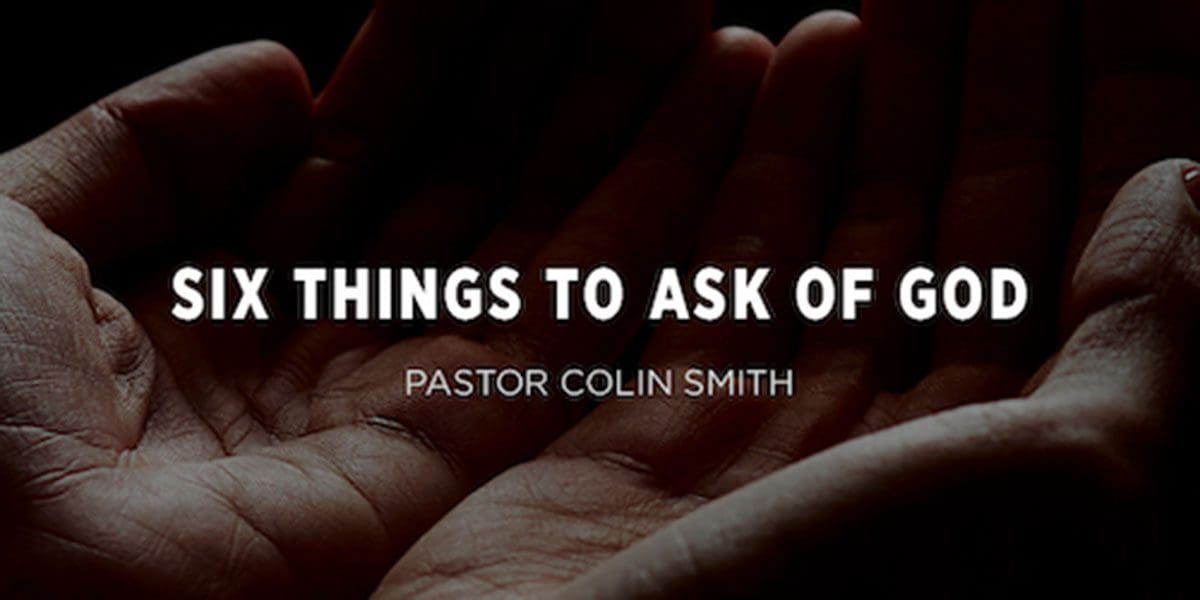On the third day there was a wedding at Cana in Galilee. (John 2:1)
We don’t know the name of the bride and the groom, but we do know that they invited Jesus to their wedding, “Jesus also was invited to the wedding with his disciples” (John 2:2).
The presence of Jesus at a wedding is full of significance for us. Marriage is a wonderful gift of God in which a man and a woman can serve him together as one. It is striking that this wedding is the occasion of the first great miracle of Jesus Christ on the very first week of his public ministry. The first miracle of Moses was to turn water into blood, and it was a sign of God’s judgment. But when Jesus turned the water into wine it was a sign of God’s blessing.
It is a good thing when Jesus is invited into a marriage. In choosing who you will love, ask yourself, “Can Jesus Christ be at the center of this love?” And in choosing who you will marry, ask yourself, “Will Jesus Christ be at the center of this marriage?”
For those who are married, remember that if you say, “We must put our marriage first,” you run the danger of making your marriage an idol. Choose rather to say, “Let’s put Christ first in our marriage.” Let’s be sure, not only that he is invited, but that this marriage is offered to him and that he rules over us as our sovereign Lord. This is where his blessing is to be found.
I want to make two observations about the marriage to which Jesus is invited.
A marriage where Jesus is present can run into trouble.
When the wine ran out… (John 2:3)
The wedding was a great occasion and the marriage had begun well. Everyone was having a marvelous time. But then the wine ran out! John describes what Jesus did for this couple as a ‘sign’ (John 2:11). And a sign points to something beyond itself. So surely we are to see here something that is familiar to all of us today.
There will be couples here today who started out with genuine love and warmth of affection. For some time the wine of your love was flowing freely, but now it seems that it is running out. What once brought you joy and gladness seems no longer to be present.
Right now, there are only a few people who know about it. You know, and your spouse knows, even if you have never spoken about it. Some folks who know you well may have guessed, but as far as anyone else is aware all is well in your home and in your marriage.
But behind the scenes there is a problem and you don’t know what to do about it.
You find yourself saying, “But we’re Christians! How can this be? We invited Christ into this marriage. We’ve made Christ the Lord of our home. How can the wine be running out for us?” Being a Christian does not insulate you from the realities of life in this world, and this story reminds us that a marriage can be in trouble even when Jesus is present.
But that’s not the end of the story and here’s what you should take from this story if the wine has been running out for you.
A marriage can run into trouble, but where Christ is present there is hope.
This surely is the main point of the story. Christ turns water into wine. And this is a sign of who he is and of what he has come into the world to do.
He comes into a world where things are not going as we had planned. Here’s this wedding and it’s all been organized, but it’s not going as planned. He is able to bring gladness and blessing where the joy that we once knew is running out.
Now obviously, the question is: “How did this happen? And how can this great gift of joy restored and of blessing renewed happen for people like us when the wine has run out?” I want to offer three answers to that question from the story: Ask. Trust. Look.
1. Ask Jesus and Submit to His Purpose
- The mother of Jesus was there (John 2:1).
- The mother of Jesus said to him “They have no wine” (John 2:3).
- Jesus said to her… (John 2:4).
- His mother said to the servants, “Do whatever he tells you” (John 2:5).
We are looking at the marvelous example of Mary, the mother of our Lord, who features prominently in this story.
Prayer involves asking help from Jesus.
Mary recognizes that that there is a problem and she brings it to Jesus, “The mother of Jesus said to him ‘They have no wine’ (John 2:3). She sees the need and she brings it to Jesus. This is a marvelous example. What do you do when you see a need in your marriage, in your home, or in your family?
John Bunyan said, “You can do more than pray after you have prayed. But you can’t do more than pray until you have prayed.” If the wine has been running out for you, it would be a good thing on this Valentine’s Day to say, “We cannot go on pretending all is well when we know that it is not. We must ask for help and the first person we must ask is Jesus Christ.”
Jesus gives a surprising response to Mary’s request: “And Jesus said to her, ‘Woman, what does this have to do with me? My hour has not yet come’” (John 2:4). Jesus refers to his ‘hour’ seven times in John’s Gospel,[1] and on each of these occasions, the ‘hour’ refers to the time when he would be subject to the will of others.
The hour would come when Jesus would be given into the hands of sinners, who would scourge him, condemn him, and crucify him. But that hour had not yet come, and the fact that Christ says this to Mary, his own mother, is full of significance.
Mary is not in a position of bending Jesus Christ to her will. She may come and she may ask, but Christ is not under an obligation to do what she asks, or indeed, is he under any obligation to do what any of us may ask.
Christ is the mediator between us and the Father. Mary is not a mediator between us and Christ. She is in exactly the same position as we are. She has the ear of Christ, yes, but so do you. She submits herself to the will of Christ and so must you.
That leads to the second observation:
Prayer involves asking help from Jesus and submitting yourself to his purpose.
Mary gives us a wonderful example to follow. First, she asks for help from Jesus and then she submits the matter and herself to Jesus: “His mother said to the servants, ‘Do whatever he tells you’” (John 2:5).
None of us knows how God will use what is happening in our lives to advance his great purpose for us, but you can be sure of this: Christ will use every circumstance to advance his loving purpose for you. This is true of every illness, every heartache, every loss, and every disappointment. When the wine runs out, Christ will show his glory, but it is not for us to tell him how or when.
Prayer involves asking help from Jesus and submitting yourself to his purpose. So here’s how you pray when the wine is running out for you: You tell Christ what is happening, and you tell him that you need his help, and then you ask him to advance his great purpose in your life through it.
Husbands, you don’t say “The wine is running out, so change her!” Wives, don’t say, “The wine is running out, so change him!” You say, “Lord, here is the reality that we are facing. Our great desire is that your glory should be revealed and that your purpose should be fulfilled. We are ready for whatever that will take.”
What a marvelous thing it would be if couples for whom the wine is running out would do this today. If your spouse is not ready to come to Christ like this with you, make a start by coming yourself.
2. Trust in Jesus and Obey His Commands
- Jesus said to the servants “Fill the jars with water” (John 2:7).
- And he said to them, “Now draw out and take it to the master of the feast” (John 2:8).
Here we are looking at the example of the servants, who play an important role in this story.
The obedience of the servants is clearly noted. When Jesus says, “Fill the water pots,” John records “they filled them up to the brim” (John 2:7). When Jesus says, “Take it to the master of the feast,” John records, “So they took it” (John 2:8).
Jesus Christ could easily have turned water into wine without any involvement from the servants, but he did not choose to do so! God works with his people. He works as his people pray and as his people are actively involved in his service and in obedience to his commands.
His blessing came to the wedding guests through the obedience of the servants and not without it. Gifts of grace come from the hand of God, but they are received by his people through the prayers and the work of his servants. The New Testament refers to us as “God’s fellow workers” (1 Cor. 3:9).
Here’s the principle: God will do what only he can do, as you do what he has called you to do. That’s why it is never enough for God’s servants to pray, “Lord, we want you to bring revival. Lord, we want to gospel to run.”
What do you do when the wine is running out? You pray. You ask Christ to help you and you submit yourself to his will. But you don’t leave it there. The gift of the new wine is given as the servants are obedient to all that Christ told them to do.
The Bible speaks about “the obedience of faith” (Rom. 1:5). It takes faith to step out in obedience, especially when you cannot see how what Christ is calling you to do relates to what you’ve asked him for help with in the first place.
Think about what these servants are told to do: “Fill these large pots with water!” The pots held 20-30 gallons of water each (John 2:6), so filling them means getting 120-180 gallons of water from the well! That was no small task and these servants had guests to attend to. Nobody was asking for water, so this hardly seemed like a priority. But that is what Jesus told them to do. “Do whatever he tells you.” So they did it.
Then Christ says, “Draw some out and take it to the master of the feast” (John 2:8). We are not told when the miracle happened. Did the water become wine in the pots or as it was drawn out? If it was the latter, then drawing it out was another extraordinary act of obedient faith on the part of the servants.
There will be times when you wonder what good can come from the basic things that Christ is calling you to do, when what you are worried about, for example, is a relationship: “Get yourself saturated in the Word of God and in prayer. Get yourself into relationship with other Christians. Look for ways to reach outside of yourself to serve others.”
How is this extraordinary blessing of Jesus going to come into the lives of people today?
Learn from this story: Ask Jesus and submit to his purpose. Trust in Jesus and obey his commands. Christ will work through your prayers and through your obedience to bring joy and blessing into your own life and into the lives of others.
3. Look to Jesus and Discern His Work
The first of his signs, Jesus did at Cana in Galilee, and manifested his glory. (John 2:11)
Christ manifested his glory. The question is—to whom?
The glory of Jesus was revealed, but there were many people who did not see it.
Who saw Jesus’ glory? Mary, who asked of Jesus, did. The servants, who obeyed Jesus, did. The disciples, who followed Jesus, did.
But the emphasis in the story is not so much on the people who knew what Christ had done, but on the people who were completely unaware of the blessing that they had just received: “The master of the feast tasted the water now become wine, and did not know where it came from” (John 2:9). [As far as we can tell, the bride and the bridegroom did not know either!]
The master of the feast does not know that the good wine is a gift from Christ, so he gives credit in the wrong place. He calls over the bridegroom and says to him, “Everyone serves the good wine first… But you have kept the good wine until now” (John 2:10).
I wonder how the bridegroom responded to that. Did he take the credit? “Well, it was all in the plan you know!” Or maybe he just passed the compliment off: “Glad you like the wine.”
Most of the guests went home that day completely unaware of the glory that had been manifested. Back at work on Monday: “How was the wedding?” “Oh, it went off really well. The bride looked marvelous, and they had some really good wine, especially toward the end.”
There is a wedding filled with guests, who enjoy the best wine, directly from the hand of Christ. But they don’t know where the gift had come from. Christ remains in the background throughout this story. The guests are absorbed in the joy of the wedding. All they see is the servants, hard at work serving this marvelous wine. They enjoy the gift without knowing the giver.
It is possible to enjoy good gifts from God and not yet to have discovered where they come from. There is something here for everyone who has been greatly blessed. The wine is flowing for you. Your troubles are few and your joys are many. The real problem is that you’re giving credit in the wrong place, and you do not glorify him as you would if you knew where these blessings come from. Where did these gifts come from?
You may say, “I worked hard for what I have and what I enjoy.” The servants worked hard, but if it had not been for Jesus all they would have had to show for it would have been six stone pots filled with 180 gallons of water. If it had not been for the blessing of Christ, your work would be the same. Unless the Lord build the house, its builders labor in vain!
You may say, “Yes, but I’ve made good decisions. I’ve taken charge of my life, unlike many others.” The master of the feast was in charge of the wedding, but if had not been for Jesus, the whole thing would have been a complete disaster. He would have been remembered by the whole town as the man who was master of the wedding feast when the wine ran out, and that is not good for future business.
“Satan has desired to sift you like wheat but I have prayed for you that your faith will fail not.” What disasters would have fallen on you if you had not been kept from them by his loving hand?
“Every good gift and every perfect gift is from above” (Jas. 1:17). Every good gift comes from above. Everything that brings you pleasure and joy. The gift of music, the gift of art, the gift of work, the gift of sport, the gift of love, the gift of health, the gift of food and shelter, the gift of peace, and the gift of joy.
All the good gifts around us are sent from heaven above, so thank the Lord, yes, thank the Lord for all his love. How perverse must the human heart really be that we are habitually so quick to blame God for all that is evil, and so slow to thank him for all that is good!
Here’s how you want to live, Christian: Blame the first Adam for evil! That’s where suffering, violence, greed and death come from. It was his disobedience that brought these things in, and because his nature is in us, we suffer from all of these things to some degree too.
Credit the last Adam (this is what Jesus is sometimes called) with good! Peace, love, joy and freedom all come from his hand. It is his obedience that brings all these in, and if Christ is in us, all of these things will be ours as well.
The glory of Jesus has been revealed and people who see it believe.
And his disciples believed in him. (John 2:11)
May all of us see something of the glory of Jesus today. And seeing his glory, we will all the more ask Jesus for help and submit to his purpose for our lives. We will trust in Jesus and obey his commands. We will look to Jesus and discern his work. And as you do, may you be blessed to know his turning water into wine at immeasurable cost to himself and at immeasurable blessing to us.
[1] A. W. Pink lists John 2:4, John 7:30, 8:20, 12:23, 12:27, and 16:32.
[elementor-template id=”128476″]





